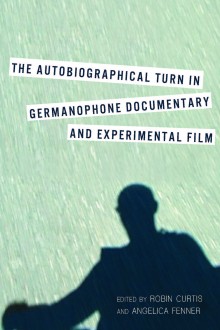Increasingly, digital technologies shape our interpersonal relationships as much as they do our sense of a coherent self. While creating provisional community across time and space, they also render us mediated subjects of a wider screen culture that is hemorrhaging conventional divisions between personal and public spheres. By interfacing so closely with our everyday habits and patterns of perception, these technologies have also led to a heightened subjectivity in contemporary filmmaking practices, particularly in the genre of personal documentary. Yet that trend is emerging at an uneven pace within different national cultures, reflective of varying levels of receptivity towards the intimacy, even narcissism, often attributed this format.
The essay collection The Autobiographical Turn in Germanophone Documentary and Experimental Film (Camden House Press, 2014), co-edited by Robin Curtis and Angelica Fenner, addresses these developments with attention to the specificities of medium, culture, and national history. Although the impulse toward self-documentation was already discernible in the 1960s in the experimental film movement that coalesced around Birgit and Wilhelm Hein, ensuing directors of the New German Cinema, such as Rainer Werner Fassbinder, Wim Wenders, and Helke Sander, also often interwove the roles of author, narrator, and film protagonist in their self-reflexive interrogations of post-Holocaust society. In the 21st century, by contrast, adult children and grandchildren both of Nazi perpetrator s and survivors alike broach the documentary camera as an empathetic psychoanalytical stimulant, one coaxing forth repressed memories and capturing fragments of testimony for posterity. Another strand of family films, those by second-generation filmmakers of immigrant descent such as Fatih Akin, produce counter-memories that reframe German national history as also encompassing a history of immigration. In turn, recent essayistic films by Sylvia Schedelbauer, Kate Hers, and Hito Steyerl, ponder the extent to which nation-states and culture industries alike collude in promoting mythologies of a unified national subject; they critically reflect upon the terms of participation in monolingual communities grounded in the illusion of cultural homogeneity and unified historical memory.
s and survivors alike broach the documentary camera as an empathetic psychoanalytical stimulant, one coaxing forth repressed memories and capturing fragments of testimony for posterity. Another strand of family films, those by second-generation filmmakers of immigrant descent such as Fatih Akin, produce counter-memories that reframe German national history as also encompassing a history of immigration. In turn, recent essayistic films by Sylvia Schedelbauer, Kate Hers, and Hito Steyerl, ponder the extent to which nation-states and culture industries alike collude in promoting mythologies of a unified national subject; they critically reflect upon the terms of participation in monolingual communities grounded in the illusion of cultural homogeneity and unified historical memory.
The conceptual introduction to this scholarly volume approaches the autobiographical as a mode recognized, indeed, produced at the site of its reception; across different epochs, consensus regarding the parameters of the textual self has evolved considerably amidst changing media. The confessional religious writing of St. Augustine, for example, was only retrospectively recognized as autobiographical, as were women’s epistolary writings of the 18th and 19th centuries and the East German prose of Christa Wolf’s Kindheitsmuster. Today, we also find this trait in contemporary performative documentaries whose makers occupy the film frame or audio track and assume a subjective stance towards events unfolding before the camera. Even films not demarcated by their authors or by critics as autobiographical may betray moments of self-inscription and glimpses into quotidian personal realities and collective memories rich in cultural and historical significance.
Angelica Fenner is cross-appointed Associate Professor of German and Cinema Studies at the University of Toronto, and the current Graduate Coordinator in the Cinema Studies Institute. She is the author of Race Under Reconstruction in German Cinema (University of Toronto Press, 2011), co-editor of The Autobiographical Turn in Germanophone Documentary and Experimental Film (Camden House, 2014), and currently completing a book project on first person filmmaking in contemporary Germany. Her interests encompass the representational politics of race and ethnicity; migration and diaspora in European cinemas; documentary theory and history; German film history.
